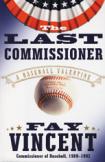Our Favorite Pastime
The authorial tone of this delightful memoir is captured nicely in its subtitle, “A Baseball Valentine,” for its spirit as in a billet-doux reflects affection, gratitude and recollection of the sweeter memories. The main title, The Last Commissioner, coined by George Vecsey, a sports reporter for The New York Times, reflects a less sweet and savory truth: after forcing Fay Vincent out as commissioner of baseball, the owners chose one of their own, Bud Selig, then owner of the Milwaukee Brewers, to carry out their bidding (in more ways than one), thereby formally abolishing the soothing fiction that “the commissioner” was an independent, impartial overseer, whose stewardship was solely “for the good of the game.”
Fay Vincent kindly spares the reader a blow-by-blow narrative of the shabby shenanigans on the part of the owners that led to his ouster. Instead, so that readers might grasp the general idea about the principals quickly, he quotes the observation of his friend John McMullen, himself a former owner of the Houston Astros, who would say that any new owner who comes into baseball, no matter how depraved, can only elevate the level of ownership. Enough said. What astonishes the reader all the more is that, despite Vincent’s up-close-and-personal encounters with the sausage factory that is now Major League Baseball, the experience failed to sour him on the beloved game itself. This book provides irrefutable evidence to the contrary.
The memoir has a three-tiered structure, each nicely balanced and carpentered, a structure that sustains variety for the reader by way of alternating chapters on less weighty to more detailed accounts without losing the relaxed, reader-friendly style. One tier is a mini-biography, wherein Vincent fondly recalls his boyhood in New Haven, Conn., his gentle, loving mother (a school teacher) and his endearingly eccentric father (an outstanding baseball and football star at Yale, class of 1931, and the person most responsible for his own passion for sports), his attendance first at Hotchkiss and then Williams College (both on football scholarships).
An unwelcome turning point arrived in his freshman year at Williams, when one of his prankish roommates removed the doorknob to their dorm room, leaving him entrapped. As college boys will, he decided to crawl out the window onto the ledge and re-enter through the window next door. He slipped on the icy gutter, fell and was paralyzed from the waist down for months. A remarkable operation by a gifted surgeon allowed him to walk again, but his sports career was over. Another took its place, for he decided to dedicate himself to “the life of the mind.” It worked. He graduated Phi Beta Kappa from Williams, then graduated from Yale Law School, worked as an attorney, then at the Securities and Exchange Commission, then in 1978 became C.E.O. at Columbia Pictures and later executive vice-president of Coca-Cola.
In 1989, his close friend Bart Giamatti, former president of Yale University, became commissioner of baseball and induced Vincent to be his “deputy.” Thus begins the memoir’s second tier, extended chapters on major controversies he and Giamatti faced together and, after Giamatti’s sudden death in September 1989, those he met alone. Some remain hot-button topics still on FAN-radio: the Pete Rose betting scandal and Rose’s subsequent banishment from baseball (guilty and how!); Yankee owner George Steinbrenner’s banishment (ditto); the San Francisco earthquake during the 1989 World Series game (Fay Vincent’s and baseball’s finest hour). These and other episodes are well told and enlightening, while Vincent’s portrait of the mercurial, charming, witty and ever-theatrical Giamatti is priceless.
The book’s third tier consists of a series of anecdotes and vignettes—at least 50 or more set pieces—devoted to people Vincent knew in baseball: players, reporters, owners (our reigning president, George W. Bush, prominent among the latter). He shared a breakfast in a hotel room with the “immortals” Joe DiMaggio and Ted Williams (probably the first and only time they were alone together) and recorded their genial and astute memories about the game. With the pitcher Roger Clemens on the hot seat in his office, he had a professional lip-reader analyze the game tapes; she pronounced him innocent of using “the magic words” in cussing out an umpire. Each funny story reads like an arrow pointing toward the “good guys” in baseball’s firmament: Yogi Berra, Phil Rizzuto, Joe Garagiola, Ralph Branca, Stan Musial, Nolan Ryan, Ken Griffey Jr. and their many firmament fellows. The most touching chapters are devoted to the old black players, veterans of the Negro Leagues who were shut out of the major leagues until Jackie Robinson’s breakthrough in 1947 (all of the proceeds from the sales of The Last Commissioner go to the fund Vincent set up for them).
This memoir might be a valentine, but it is also an ideal Christmas present for that fan you know whose life is bereft from November through April and who needs desperately to hear the cry of Play ball! in his or her heart. This book will do the trick.
This article also appeared in print, under the headline “Our Favorite Pastime,” in the November 25, 2002, issue.








